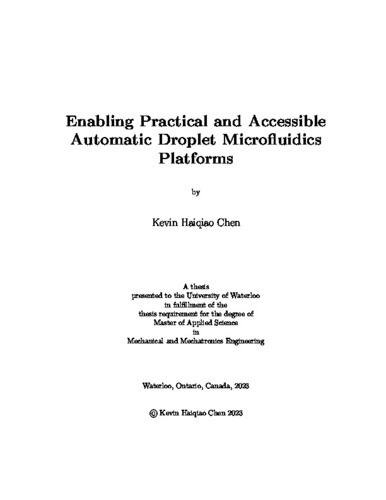UWSpace will be migrating to a new version of its software from July 29th to August 1st. UWSpace will be offline for all UW community members during this time.
Enabling Practical and Accessible Automatic Droplet Microfluidics Platforms
| dc.contributor.author | Chen, Haiqiao | |
| dc.date.accessioned | 2023-11-21 18:51:48 (GMT) | |
| dc.date.available | 2023-11-21 18:51:48 (GMT) | |
| dc.date.issued | 2023-11-21 | |
| dc.date.submitted | 2023-11-13 | |
| dc.identifier.uri | http://hdl.handle.net/10012/20113 | |
| dc.description.abstract | Droplet microfluidics has emerged as an innovative technology enabling high-sensitivity, high-resolution chemical and biological analyses via precise manipulation of picoliter-to-microliter fluid droplets. The ideal end goal of this technology is a general-purpose droplet microfluidics platform (DMP) composed of simple building blocks or modules that can be configured to perform arbitrary manipulations and analyses of individual droplets autonomously, returning desired outputs (e.g. nanoparticle synthesis) or insights (e.g. heavy metal detection) to the end-user. Although numerous innovations in droplet manipulation have emerged in the literature, most existing techniques --- broadly categorized as passive vs active --- optimize for a single application and act on continuous droplet trains, hence are difficult to generalize to arbitrary manipulation of individual droplets. Passive techniques rely on specific microfluidic chip geometries to be designed by a skilled user to perform a fixed sequence of droplet manipulations, and thus cannot be used for individual droplet control. Most active techniques embed custom actuators (electrodes, membranes, etc) within a passive system which only allows individual droplet control in localized areas, limiting the precision and resolution of droplet manipulations. A simpler and more generic technique is pressure-driven feedback control, in which droplets are sensed visually within simple passive chip geometries (e.g. T-junctions) and actuated by off-chip pumps that adjust chip inlet pressures in response to visual feedback. This approach shows that individual droplets can be stabilized and driven to arbitrary locations on-chip without the need for complex chip designs or embedded actuators, opening the door to modular automation. However, bridging the gap from this proof-of-concept to a fully automated modular platform for non-expert users requires overcoming significant practicality and accessibility challenges. Existing feedback control systems for droplet manipulation ignore time-varying behavior in the system, which gradually degrades performance and reliability, necessitating frequent manual tuning and calibration. Additionally, current software workflows require the end-user to manually set up each droplet manipulation, which does not generalize to longer manipulation sequences necessary for practical applications. Moreover, standard pressure-driven flow generation methods are either too slow and imprecise for individual droplet control, or too complex and costly to be effectively modularized. This thesis aims to address these key challenges in feedback control, software workflow, and droplet actuation to pave the way for modular automated DMPs that are practical and accessible for end-users. On feedback control, a new adaptive control system is designed to automatically perform model parameter identification online, compensating for changes in system dynamics as droplet manipulations are performed. Regarding software, a new DMP workflow is developed to allow end users to validate and execute arbitrary manipulation sequences automatically. For pressure-driven flow generation, off-the-shelf piezoelectric micropumps are evaluated as a modular, low-cost alternative to existing methods, demonstrating comparable performance in droplet manipulation. | en |
| dc.language.iso | en | en |
| dc.publisher | University of Waterloo | en |
| dc.title | Enabling Practical and Accessible Automatic Droplet Microfluidics Platforms | en |
| dc.type | Master Thesis | en |
| dc.pending | false | |
| uws-etd.degree.department | Mechanical and Mechatronics Engineering | en |
| uws-etd.degree.discipline | Mechanical Engineering | en |
| uws-etd.degree.grantor | University of Waterloo | en |
| uws-etd.degree | Master of Applied Science | en |
| uws-etd.embargo.terms | 0 | en |
| uws.contributor.advisor | Ren, Carolyn | |
| uws.contributor.affiliation1 | Faculty of Engineering | en |
| uws.published.city | Waterloo | en |
| uws.published.country | Canada | en |
| uws.published.province | Ontario | en |
| uws.typeOfResource | Text | en |
| uws.peerReviewStatus | Unreviewed | en |
| uws.scholarLevel | Graduate | en |

